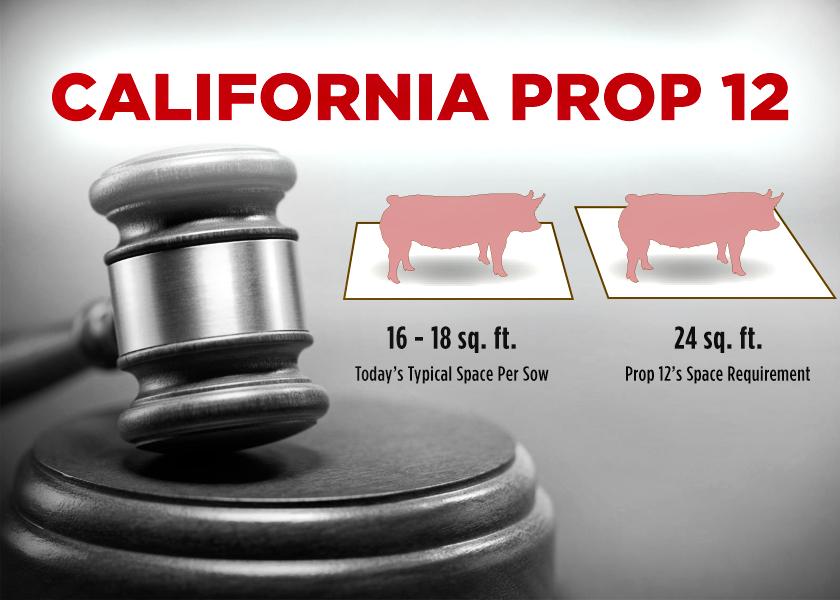BREAKING: Supreme Court Backs California Prop 12

The U.S. Supreme Court upheld California’s new humane-pork law, rejecting an industry challenge in a ruling strengthening the power of states to impose rules that have a broad economic impact on other parts of the country, writes Pro Farmer analyst Jim Wiesemeyer in his daily commentary.
The Supreme Court ruled that the case was properly dismissed by lower courts. Pork producers had said that the law could force industry-wide changes and raise the cost of bacon and other pork products nationwide, the Associated Press reports.
"This is a major blow to pork and the ag sector," Wiesemeyer wrote. "The ruling could force pork producers to implement costly changes to keep selling in the country’s most populous state."
The decision of the court was 5-4, with Chief Justice John Roberts and Justices Samuel Alito, Brett Kavanaugh and Ketanji Brown Jackson dissenting.
“While the Constitution addresses many weighty issues, the type of pork chops California merchants may sell is not on that list,” said Justice Neil Gorsuch, writing for the majority.
Wiesemeyer writes that Kavanaugh's dissent comments could mean further challenge ahead.
Kavanaugh wrote in his opinion, "I add this opinion to point out that state economic regulations like California’s Proposition 12 may raise questions not only under the Commerce Clause, but also under the Import-Export Clause, the Privileges and Immunities Clause, and the Full Faith and Credit Clause. Although the Court today rejects the plaintiffs’ dormant Commerce Clause challenge as insufficiently pled, state laws like Proposition 12 implicate not only the Commerce Clause, but also potentially several other constitutional provisions, including the Import-Export Clause, the Privileges and Immunities Clause, and the Full Faith and Credit Clause. In other words, if one State conditions sale of a good on the use of preferred farming, manufacturing, or production practices in another State where the good was grown or made, serious questions may arise under the Import-Export Clause. I do not take a position here on whether such an argument ultimately would prevail. I note only that the question warrants additional consideration in a future case. Under this Court’s precedents, one State’s efforts to effectively regulate farming, manufacturing, or production in other States could raise significant questions under that Clause [Privileges and Immunities Clause]. Again, I express no view on whether such an argument ultimately would prevail. But the issue warrants further analysis in a future case."
Kavanaugh concludes that it appears that the "properly pled dormant Commerce Clause challenges under Pike to laws like California’s Proposition 12 (or even to Proposition 12 itself) could succeed in the future — or at least survive past the motion-to-dismiss stage. Regardless, it will be important in future cases to consider that state laws like Proposition 12 also may raise substantial constitutional questions under the Import-Export Clause, the Privileges and Immunities Clause, and the Full Faith and Credit Clause."
Prop 12 History
Proposition 12 bans the sale of pork within the state unless pregnant pigs are allowed at least 24 square feet of space and the ability to stand up and turn around in their pens. The National Pork Producers Council and the American Farm Bureau Federation, which sued in 2019, say the measure violates the so-called dormant commerce clause, a doctrine that says the U.S. Constitution limits the power of states to regulate commerce outside their borders without congressional authorization.
The Biden administration had urged the justices to side with pork producers, telling the court in written filings that Proposition 12 would be a “wholesale change in how pork is raised and marketed in this country” and that it has “thrown a giant wrench" into the nation's pork market, The Associated Press reports.
"Pork producers argue that 72% of farmers use individual pens for sows that do not allow them to turn around and that even farmers who house sows in larger group pens do not provide the space California would require," The Associated Press reports. "They also say that the way the pork market works, with cuts of meat from various producers being combined before sale, it is likely all pork would have to meet California standards, regardless of where it is sold. Complying with Proposition 12 could cost the industry $290 million to $350 million."
The industry argued unsuccessfully that California is violating the Constitution by regulating commerce outside its borders, Wiesemeyer reports.
"During arguments in the case in October, liberal and conservative justices underscored the potential reach of the case," The Associated Press reports. "Some worried whether greenlighting the animal cruelty law would give state legislators a license to pass laws targeting practices they disapprove of, such as a law that says a product cannot be sold in the state if workers who made it are not vaccinated or are not in the country legally. They also worried about the reverse: How many state laws would be called into question if California’s law were not permitted?"
NPPC said in a statement that it will continue to fight for the nation's pork farmers and American families against misguided regulations.
"We are very disappointed with the Supreme Court's opinion. Allowing state overreach will increase prices for consumers and drive small farms out of business, leading to more consolidation," said Scott Hays, NPPC president, and Missouri pork producer. "We are still evaluating the Court's full opinion to understand all the implications. ”
*This is a breaking story. Updates will be added here.*
Read More:







